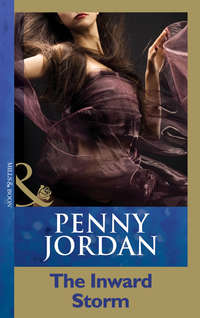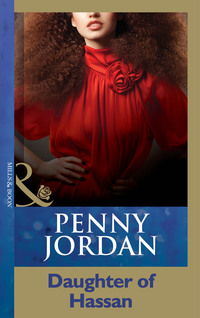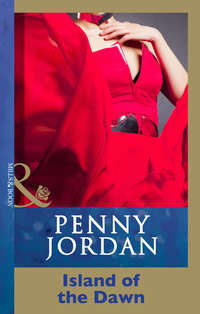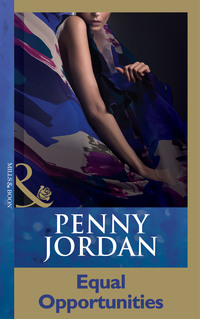
Полная версия
Power Play
“You must go to him,” Naomi told her quietly. “If you do not, you will be taken to him by the other men, and that will be worse. Better to endure what must be with your pride intact.”
“Even though my body might be destroyed!” Layla cried hysterically. She was still young enough to want to cling to her mother and weep tears of fear, but Naomi was right. And her mother would not be able to protect her, no matter how much the tribe might revere her.
It was a night that would haunt Layla for the rest of her short life. She went to Rafe’s van sick with fear. When she managed to crawl out of it hours later when he had finally fallen asleep her body was a mass of bruises and raised weals.
Naomi bathed them for her, her own eyes stinging with tears, but there was nothing she could say. Layla looked at her with the eyes of a wildcat caught in a snare. Her daughter’s spirit was as broken as her body.
Layla did not have the stoicism to endure such physical abuse; hatred for Rafe was the only emotion she could feel now. Not even to her mother could she describe the things he had done to her; the manner in which he had abused her, taking her not as a man but as a perverted animal. Her body shook as she tried to blot out what had happened. Naomi gave her a soothing potion to drink, thinking to help her sleep, but while her mother’s back was turned, Layla poured it away.
She could not endure another night like this one; she would not endure it.
While the rest of the camp slept she crept silently away. The constable on duty at the police station listened to her story in stunned shock, wondering whether or not to believe it. The sergeant, woken from his bed and brought grumbling to the station, took one look at Layla’s white, bitter face, and knew that he had found the motive for Duncan’s death.
They arrested Rafe at dawn; and he was sentenced to death two months later. He never reached the hangman’s noose. Somehow, from somewhere, he obtained a secret poison. He was found dead in his cell one morning, his body already stiffening, his eyes glaring bitterly into emptiness.
The rest of the tribe shunned Layla. They elected a new leader, who decreed that Naomi must be allowed to stay among them, but that Layla must leave.
When Naomi discovered that her daughter was pregnant, she pleaded with the tribe for clemency, and it was granted; Layla would remain as an outcast from the tribe, but she would be allowed to travel with them.
Her daughter’s frail, wraithlike condition appalled Naomi. The thought of the coming child was the only thing that kept her alive. Duncan’s child. Layla said the words over and over again to herself like a mantra.
“It could be Rafe’s child,” Naomi told her.
Layla shook her head, and looked at her mother with eyes far too old for such a childish face.
“No, it could not. He did not take me as a man takes a woman; he did not spill his seed inside me.”
Rachel Lee was born to her mother during her eighth month of pregnancy. To see Layla’s thin, almost sticklike body bloated almost obscenely with her pregnancy caused Naomi almost constant pain. Some fierce spirit seemed to burn in Layla, giving her a pride and a determination she had never thought to see in her fey, spoiled child.
The birth was a difficult one, and although they paused to listen to the cries coming from the caravan, none of the other women came to help. Naomi did not mind. She was an experienced midwife, and the child was well positioned, although perhaps a trifle large for Layla’s emaciated frame.
It was only when she placed the child in her daughter’s arms that she saw Layla smile properly for the first time since Duncan’s death.
“She is beautiful,” she told her mother. “You will call her Rachel, and you will love her for me, won’t you, Mother?”
Already a swift-flowing river of red blood was carrying Layla away from them, and Naomi knew it could not be staunched; that her daughter was dying. She had known it from the moment Layla gave birth. In some ways she felt her daughter had willed herself to stay alive only as long as she carried her child. She had in any case been as one dead to the rest of the tribe from the moment she betrayed Rafe.
There was no burial pyre for Layla, no grieving or lamenting for the brief life so quickly extinguished, and although the tribe accepted Naomi, little Rachel grew up knowing that she was not truly part of it; that there was something mysterious about her own birth and the death of her mother, that set her apart from the others.
She soon learned that her mother’s name was one that must never be spoken and that she and Naomi were allowed to stay with the tribe as a favour rather than as a right.
Her pain at the way she was excluded was something she learned to cloak with pride and indifference, and she was soon being described as far too much her mother’s daughter. She was not popular with the other children, and she knew it. It made her only more aloof and withdrawn. Only Naomi loved her, only Naomi stood between her and the hostility of the others.
5
Yes, she had learned young what it meant to be an outcast, Pepper reflected wryly.
Almost from the moment she could toddle she had been shunned by the other Romany children, but through their cruelty she had learned two valuable lessons.
The first had been to conceal her hurts. As a child she had been sensitive to a degree that had meant the other children’s contempt and dislike of her had constantly lacerated her. She had known as children always know that they neither accepted nor liked her, but she had not known why, and so she had learned to cover her feelings with a protective stoical acceptance. That had been the second lesson she had learned—not to let others see that they had the power to hurt her.
Not that the others had deliberately wanted to hurt her; it had simply been that she was not one of them; that her mother had offended so far and so deeply against their code that her child would never be one of their number.
Pepper’s childhood had been spent moving with the tribe through the country in their nomadic annual journeyings; formal schooling for gypsy children in those years had been spasmodic at best—not even the most ardent of school inspectors could spare the time to check up on the constantly caravanning tribes and their children—but Naomi had been taught to read and write by her husband and she was immensely proud of her skill.
She too had seen what was happening to her grandchild, and while she grieved over it, she knew that according to the rules of her people they were not being deliberately unkind.
Occasionally it crossed her mind that she should approach Sir Ian MacGregor, but she doubted that he would welcome Rachel any more than her own people did, and then the winter that Rachel was seven Ian MacGregor died and the land passed to a very distant member of the family.
Since Duncan’s death, the gypsies had not revisited the Glen, knowing that they would not be welcome, and the loss of the privileged campsite was chalked up as another black mark against Rachel.
It was Naomi who insisted that she learn to read and write; who sent her to school whenever the tribe stopped long enough for her to do so.
Knowing how proud her grandmother was of her own ability to read and write, Rachel never told her of the purgatory her own schooldays were. Just as she was unacceptable to the tribe, so she was also an outcast to the non-Romany children. They laughed at her clothes, calling them rags, and they sneered at her heavily-accented voice and the gold rings she wore in her ears. The older boys tugged on them until her lobes bled, and called her a “dirty gypsy”, while the girls huddled together in giggling gaggles to gaze at her darned jumpers and patched skirts.
With no man to protect them or hunt for them, Naomi and Rachel were forced to depend on whatever Naomi could make from telling fortunes and selling pegs. Occasionally in the depths of the night, one of the women of the tribe would knock on her door and ask Naomi for the special potions she made in the summer months from wild flowers and herbs.
Rachel watched these transactions wide-eyed and curious about what it could be that brought the women of the tribe to her grandmother’s door late at night, but all Naomi would say when she asked her was that she was too young to understand. The herbal lore which she had learned from her own mother and which she had tried to teach her own feckless daughter was something Naomi was not going to pass on to her granddaughter. None of the women of the tribe would come to Rachel for advice and potions the way they did to her. She was, after all, one of them, and still respected, although now their respect was tainted with pity, but Rachel never would be; she was the daughter of a gorgio, and it had been for the love of this man that Layla had betrayed one of her own, breaking the sacred gypsy code. Now when she grew older Rachel’s life would lie apart from that of the tribe, and this troubled Naomi.
She was getting old, and her bones ached in the cold and the damp. She hoped that by sending Rachel to school she could in some way prepare her grandchild to enter into the gorgio way of life, and because Rachel loved her grandmother she didn’t tell her that she was derided and disliked as much by her father’s people as she was by her mother’s.
School, which had been a place of fascination and delight at first, when she had absorbed everything the teachers could tell her, had now become a hated prison from which she escaped as often as she could, often spending her days in complete isolation in the hills and the fields.
When she was eleven her body started to change, and with it the reactions of her peers. Boys at school who had pulled her hair and jeered at her now tormented her in different ways, trying to pinch the small swellings that tightened the fabric of her shabby clothes.
Her hair, always thick and lustrous, seemed to darken and curl with a vivid life of its own, her body alluringly changing shape. Rachel knew what the changes portended; her tribe lived close to nature, and its girls were taught to be proud of their womanhood.
Even one or two of the young men glanced at her sideways as she helped her grandmother to gather kindling or worked with her on her pegs and baskets, but they didn’t forget who her mother was, or what she had done.
While the other girls of her age in the tribe tested their new-found femininity, laughing and flirting with their male peers, Rachel instinctively suppressed hers. She was a child of the shadows, her grandmother often thought sadly, watching her pensive face and too knowing eyes. As though she had been gifted with second sight Rachel knew instinctively that the rest of the tribe were looking for signs of her mother in her; as long as she was quiet and unobtrusive no one bothered about her.
But some things are impossible to hide, and the way her body was blossoming and developing was one of them.
The pinches and lewd remarks of her schoolmates was something she quickly learned to ignore, just as she had learned to ignore their jibes about her clothes and her speech. She wasn’t the only girl who had to endure this rough male teasing, but the others all had friends, families, supporters and protectors whom they could call upon if the boys’ tormenting became too familiar. Rachel had no one; she knew it and her tormentors knew it.
The gypsies’ progress through the country was an annual one. At the time of the Whitsun fairs they were always in the north of England; among the mill towns of the north-west; grimy, enclosed ribbons of towns set in stark valleys, whose inhabitants were the inheritors of the Industrial Revolution; a grim and starkly realistic people who had often known the harsh bite of poverty.
The lives of the people were as enclosed as the hills surrounding their valleys; their minds as narrow as their habitat.
The mills were closing, being driven out of existence by imports from Pakistan, cheap cloth produced by cheap labour. The secondary school in the valley was overflowing with teenagers who would have no jobs to go to; the mills that had employed their parents and grandparents were closing, and the atmosphere within the valleys was one of resentment and bitterness.
This particular stopping place on their annual pilgrimage was one that Rachel had always detested. The poverty of the people in the valley was almost on a level with that of her own tribe, and because of it the valley people jealously guarded their rights and privileges. Outsiders weren’t welcome whoever they were; and the gypsies were disliked and detested here much more than they were in the richer south of the country.
There were few pleasures to be had for the people inhabiting these valleys full of “dark Satanic mills”. Whitsuntide was one of them.
The religious persuasion of many of the inhabitants sprang from Methodism, the cornerstone on which the Industrial Revolution had been built, but this did not prevent the people from throwing themselves into their Whitsuntide celebrations with enthusiastic vigour. The highlight of these celebrations was the Whit Walks. For weeks beforehand the females of the family would gather round to gaze consideringly at the “catalogues” to choose the all-important outfit for the Walk. The Whit Walks were an unashamed opportunity to show off. A new outfit was an absolute essential, if family pride were to be upheld. Everyone would line up to walk through the streets in their new clothes; afterwards families would gather for high tea, and then later still the teenagers would be let loose to attend the fairs that had set up in the market squares.
It was these fairs which brought the gypsies to the north-west. There were rich pickings to be had from them, what with fortune-telling, working on the fairs themselves and selling their wares.
Rachel hated the whole thing. She hated the taunting looks the other girls in her class gave her while they giggled behind their hands about their new outfits. She hated knowing that she was an outcast, that she was being made fun of, but now this particular spring, with her body burgeoning into that of a woman, she hated it even more. The girls resented her glowing prettiness, and the boys lusted after the growing development of her body. The fact that she wasn’t one of them, that she was an outcast, made her an easy target for their malice and male vulgarity.
She had long ago perfected the art of ignoring all that was said about her, of pretending that she simply hadn’t heard the insults. But this particular morning, knowing that the whole school would be seething with excitement over the coming Whitsuntide break, she knew she could not face them. Always sensitive to the opinions of others, she had found that with the onset of puberty her sensitivity had increased. Sometimes the effort of forcing herself not to cry in the face of the jeering taunts of her schoolfellows made her drive her nails deep enough into the palms of her hands to draw her own blood.
The northern valleys possessed three modes of transport; the road, the railway and the canal. Rachel was walking alongside the latter, pausing now and again to watch a moorhen with her chicks or to study the fleeting shadow of tiddlers as they changed direction at the sight of her shadow. The canal had been abandoned as a transport route long ago, and the rotting lockgates and weed-filled waters gave silent testimony to its decay. Mills long abandoned by owners who could no longer afford to compete with foreign imports reared up darkly alongside the towpath, casting dark shadows, their windows gaping emptily, the glass broken, their interiors long silent.
Occasionally a golden bar of sunlight slatted through the bleakness of the building. Rachel liked walking. It soothed her, gave free rein to her thoughts. She shivered as she walked beneath one of the narrow bridges, feeling the cold and damp seeping down through the stone. She passed few people as she walked. The occasional old man walking his dog; courting couples, giggling. Across on the other side of the valley she could see men working in their allotments alongside the railway lines, the narrow black lines of terraced houses blotting out the sunlight.
This particular valley was very long and narrow, the hillsides treeless. It was a grim and depressing place and Rachel hated it. Whenever they came here she suffered a sense of being shut in; she loathed the oppressive atmosphere that infiltrated the place.
Outside a row of terraced houses overlooking the canal she could see one woman donkeystoning her steps. She was wearing the all-enveloping pinafore that was the uniform of the married woman here. She looked up and saw Rachel and scowled at her.
“Be off with you!” she called out harshly. “We don’t want no dirty gypos round here!”
Rachel was impervious to her insults, and walked on to where the river Calder ran alongside the canal. The towpath had crumbled away at the edges here. On one side it was level with the canal and on the other it dropped away to where the river ran sluggishly below, its progress choked with the detritus of human living—old rusty prams and bicycles, tin cans, and a variety of other rubbish that had been slung out of back yards and into the river.
She paused by a gap in the dismal line of terraced houses to enjoy a warm bar of sunlight. In front of her was the back door to a small pub. A man came out and staggered across to the gents’, and then changing his mind, instead relieved himself into the river.
Rachel moved on, ignoring him. One day she would escape from all this, from people who disliked and taunted her. One day…
Daydreams were the only things that made her life bearable, and she escaped into them whenever she could. She enjoyed reading and from the books she read she knew that there was another way of life, very many other ways of life, and one day…
Her daydream was brutally crushed when she heard someone call out her name in a jeering voice. Her whole body tensed as she recognised the harsh male voices and came to an abrupt halt in front of a gang of boys she recognised from school. They were all older than her, due to leave school at the end of the summer term. They were all dressed in grubby jeans and cheap leather jackets. The rank smell of young male bodies closed offensively round her as they came closer. Resolutely Rachel stood her ground, deliberately avoiding any form of eye contact. Her heart was pumping like a terrified rabbit’s, but her body was completely still.
“Lost yer tongue, gypo?” one of them taunted. His eyes shifted from her face to her breasts. “Got a fine pair of tits growing there, ain’t yer? They say gypos make good lays…”
The coarseness of his comments and the laughter of his friends increased her terror, but Rachel knew it would be madness to even try to run. That was what they wanted her to do. They could hardly rape her here in broad daylight, she reassured herself stoically, as the lad reached out and pressed a filthy hand against the front of her dress. She had to fight against her instinctive desire to tear at him with her hands and nails, to rid her body of his unwanted presence, but long after they had jeeringly let her go past, calling out obscenities after her, she felt tainted by the encounter, her body still shaking with a mixture of outraged pride and feminine fear.
During the Whit week festivities her grandmother was busy telling fortunes, and Rachel escaped to the hills, ranging over the moorlands where thin half-wild sheep foraged and the land was barren and bare. Here and there the remnants of some long-ago drystone wall boundary darkened the landscape, but in the main it was untouched by man’s hand apart from the odd reservoir mirroring the swift movement of the clouds across the hills.
At Whitsuntide the people of the valleys went on holiday, the more affluent of them sometimes for as much as three or four days, the poorer just on a day trip, but all of them to the same venue—the Lancashire coast and Blackpool. Rachel watched the coaches depart filled with them, and heard them come back at night. The gypsies were camping on a spare piece of land, close to the market square where the buses terminated, and late at night the coaches would disgorge their passengers, replete on beer, candy floss and fish and chips.
Here in the small town centre a viaduct spanned the canal and road, carrying the railway overhead, and at night these arches were the haunt of eager lovers. The tribe looked down on the gorgio teenagers and their lack of modesty, but Rachel knew that many of the young men, especially those who worked on the fairs, slipped away late at night to enjoy the favours of the girls who gathered in giggling masses beneath the viaduct.
One night as she walked beneath them on her way back to the camp, she recognised one of the intertwined couples. Ann Watts was in her class at school, although she was two years older than Rachel. Ann Watts was described as “slow”, but there was nothing slow about the way she responded to and attracted the opposite sex. Jealous of her position as acknowledged sex queen of the school, Ann Watts was one of Rachel’s most vindictive enemies.
It would be many years before Rachel would be able to recognise the other girl for what she was and to pity her for it, that night as she saw Ann voluptuously pressing her body against Tyler Lee.
Tyler Lee was the oldest of the three brothers; tall for a gypsy, with a shock of wildly curling black hair. At seventeen his body was hardened and well muscled by the work he did on the fairs and labouring in the fields during the summer. His skin was brown, his eyes black as jet. He was proud of his Romany blood and destined to marry his second cousin. Rachel knew this, but Ann Watts did not. To her Tyler Lee epitomised the glamour she saw every week when she visited the local flea pit. He was the best-looking boy she had ever seen, far better-looking than the lumpy dull boys she was at school with; and better still, Tyler was dangerous. He rode a motorbike that he had put together from parts garnered here and there during his travels, and he knew exactly the effect he had on a girl when he looked at her from out of those night-dark eyes.
Although Ann Watts didn’t know it Tyler despised her, just as he despised all the gorgio women who desired him, and Ann Watts was very far from being the first. Tyler had first realised the potential of his sexuality when he was fourteen years old. He had lost his virginity to a bored, thirty-odd-year-old housewife in Norfolk, exchanging it for his motorbike and enough money to buy himself the coveted teenage uniform of black leather jacket. Since then there had been more bored housewives and Ann Watts than he had cared to count.
Ann Watts was not destined to remain in his memory for very long. She wriggled against him provocatively, enjoying the rhythmic thrust of his hips. Tyler would be the third boy with whom Ann had “gone all the way”, and already she was enjoying savouring what she was going to tell her friends afterwards. She liked the shocked, wide-eyed way they listened to her confidences. They were all younger than she was, and still virgins.
Out of the corner of her eye she watched Rachel go past, and glared at her. She disliked the proud way the younger girl moved, almost as though she thought that somehow she was better than anyone else. How could she be? Everyone knew that gypos were nothing better than thieves, and that they never washed.
Ann had a bath once a week, in the new bathroom that had just been installed in the terraced house. Theirs was the only house in the street to have an indoor lavvy as well. Ann’s father was a foreman in one of the few mills still working and her mother served school dinners at the local Tech. And Ann was their only child. Already Mrs Watts was boasting proudly that her Ann would marry young, she was that pretty. All the boys were after her.
Sensing that he had lost her complete attention, Tyler pushed her firmly against the hard stone of the viaduct wall, thrusting himself against her open thighs, demanding, “Who you looking at?”









